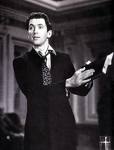Justice Kennedy Goes to the Movies
 Those industrious enough to reach the final paragraphs of the recent opinion of the Court in Citizens United v. Federal Election Commission (2010) might have been surprised to find Justice Kennedy discussing Mr. Smith Goes to Washington (1939). A Hollywood classic directed by Frank Capra, the film is the fictional story of a handpicked bumpkin Senator played by Jimmy Stewart, who sees the light, dramatically filibusters, and in the end teaches the Congress how to behave. Justice Kennedy’s argument seems to be that if the campaign-related indictment of Hillary Clinton in the film titled Hillary: The Movie could be suppressed, the same fate could befall a beloved work such as Mr. Smith Goes to Washington.
Those industrious enough to reach the final paragraphs of the recent opinion of the Court in Citizens United v. Federal Election Commission (2010) might have been surprised to find Justice Kennedy discussing Mr. Smith Goes to Washington (1939). A Hollywood classic directed by Frank Capra, the film is the fictional story of a handpicked bumpkin Senator played by Jimmy Stewart, who sees the light, dramatically filibusters, and in the end teaches the Congress how to behave. Justice Kennedy’s argument seems to be that if the campaign-related indictment of Hillary Clinton in the film titled Hillary: The Movie could be suppressed, the same fate could befall a beloved work such as Mr. Smith Goes to Washington.
The two films’ only similarity seems to be that they are indeed films. One film is fictional, but the other attacks an actual Senator and Presidential candidate. One is designed to entertain, but the other is designed to influence an election. And most importantly, one is a work produced by the culture industry designed to make a profit, but the other is a work funded from corporate profits designed to change opinions.
Are Justice Kennedy and the other members of the Supreme Court majority incredibly unsophisticated in their understanding of popular culture and politics, or is their analogy disingenuous? Extending the inquiry, might a comparable question be posed regarding the Citizens United opinion as a whole? The Supreme Court’s majority might be so oblivious as to think that corporations have the full panoply of First Amendment rights and that their financially self-serving broadsides are matters of free speech that enrich democracy. Then, again, the majority might simply hope it can trick us into believing that.
